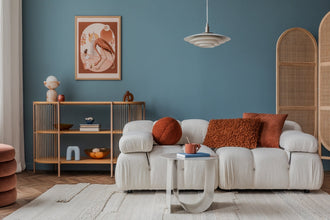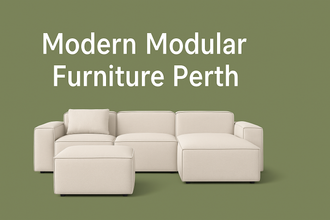
Solid wooden beds are known for their durability. They are a timeless and classic option that never goes out of style.
But how long can you expect a wooden bed to last?
If you're investing in a quality piece, it's important to know its longevity to ensure you're making a smart choice for your home and budget.
In this blog post, we'll cover:
- how long does a wooden bed last?
- factors that affect wooden bed’s durability
- signs that show it’s time to replace the bed frame
- tips for extending lifespan of your wooden bed
Moreover, we’ll introduce you to our top 5 solid wooden beds from our exclusive wood bed collection at Furniture Roots. This will make sure you make an informed decision when selecting the wooden bed for your home.
Let us help you find the perfect piece to complement your bedroom decor, at an affordable price.
Lifespan of Solid Wooden Beds | How Long do Wooden Beds Last?
Wooden beds are known for their durability and strength. But their lifespan can vary based on several factors. So, generally…
A premier quality wooden bed can last from 7 to 20 years or even longer.
The key to ensuring your bed's longevity lies in the type of wood used, the quality of craftsmanship, and how well it's maintained. Regular inspections, addressing any signs of damage, and seeking professional repairs when needed can help extend the life of a solid wood bed.
6 Factors That Affect the Longevity of Wooden Beds
When you invest in a solid wood bed, you want it to last for many years. The lifespan of your bed depends on several key factors, which we'll break down below:
1. Wood Quality / Type of Wood
The wood type used in your wooden bed frame plays an important role in its durability. Hardwoods like oak, maple, cherry, and walnut are known for their resilience and tend to last much longer compared to softwoods like pine.
- Hardwoods
Hardwoods are sourced from trees that take longer to grow. It gets you a denser, more durable wood which is less likely to scratch or dent. Although hardwoods may come with a higher price tag, their longevity and strength often make them worth the investment.
On average, hardwood beds can last 20-25 years or more with proper care.
- Softwoods
On the other hand, softwoods come from trees that grow faster and are generally less dense. This means they might be more prone to damage and wear over time. While they are typically more affordable and popular. They need extra maintenance to extend their life.
Softwood beds usually last between 5-10 years.
Explore more about: Which kind of wooden bed is good?
2. Construction
Well-constructed wooden beds with quality joints and support systems are more durable. Joints and slates are the key aspects to consider for the wooden bed construction. Let’s explore them together:
- Type of Joints
Joint types used in the bed frame affects its strength and stability. Let’s see how:
|
Joint Type |
Features / Durability Impact |
Lifespan Increase |
|
Mortise and Tenon |
· Provides exceptional stability · highly durable · used in high-quality bed frames. |
Adds +3 years |
|
Dovetail Joints |
· Known for strength · fine craftsmanship · reduces the need for nails or screws |
Adds +3 years |
|
Butt Joints |
· Simpler · less strong · can be strengthened with fasteners or adhesives |
Adds +1 year |
- Slats Quality
Slats support the mattress and need to be strong and well-designed. Their quality depends on the following factors:
|
Slat Factor |
Details |
Durability Rating |
Lifespan Impact |
|
Thickness |
Thicker: supports more weight, reduce breakage Thinner: less durable, more prone to breaking |
A C |
+2 years -1 year |
|
Orientation |
Vertical: distributes weight well, reduces wear Horizontal: provides a base level of support |
A B+ |
+2 years Base lifespan |
|
Material |
Single piece of wood: stronger and durable Glued wood sections: less durable |
A+ B- |
+2 years Base lifespan |
|
Support System |
Central support beam helps evenly distribute weight and reduces slat stress. |
A+ |
+2 years |
3. Number of Legs
The durability of the wooden bed will also depend on the number of legs. More legs mean better weight distribution, which helps prevent wobbling and extends the bed's lifespan.
Ideally, the more legs a bed has, the longer it will last.
4. Cleaning & Maintenance
Regular care is important to keep your wooden bed in good shape.
You can use a soft cloth to clean the bed frame. Avoid harsh chemicals that could damage the wood. Address spills and stains quickly to prevent damage.
Additionally, using furniture wax or polish can also help maintain the wood’s appearance and protect it over time. Proper care and maintenance can really extend bed’s lifespan by +5 years or more.
5. Environmental Conditions
Wood is sensitive to its environment. Some of environmental factors that affect the bes’s longevity include:
- Changes in humidity
- Temperature fluctuations
- Direct sunlight
It’s because wood can expand or contract with humidity changes. This leads to potential cracking or warping. To protect your timber bed frame, try to keep it in a stable environment with controlled humidity. Additionally, avoid direct sunlight which can cause fading.
Managing these conditions can help maintain your bed's integrity for up to 15 years or more.
6. Usage
How often and how you use your wooden bed also impacts its lifespan.
Beds in high-use areas, such as shared bedrooms or commercial spaces, will naturally face more wear and tear. Considering weight limits, avoiding jumping on the bed, and ensuring proper support can help prolong its life.
Beds in lower-use settings can last longer, while those in high-use scenarios need more frequent upkeep.
Proper usage adds 5-10 years to your bed’s lifespan.
Explore more about: How to Choose the Best Wood Queen Bed? 7 Factors to Consider
6 Signs It’s Time to Replace Your Bed Frame
We mostly overlook the condition of our bed frame, assuming it's fine as long as it holds up. But how do you know when it’s time for a new one?
Here are six clear signs that your wooden bed frame needs replacing.
-
Is Your Sleep Suffering?
Waking up tired or struggling to sleep well? While a bad mattress is mostly blamed, your bed frame can be the real issue. If you’ve recently upgraded your mattress but still can’t get comfortable, your frame could be too old, damaged, or unsupportive to do its job.
-
Unstable and Shaky Bed
Does your bed feel shaky even after tightening all the screws? A wobbly frame could mean the joints are weakening or the wood itself is deteriorating. An unstable bed isn’t just annoying. It’s a sign you need a sturdier replacement.
-
Creaking Sounds
Is your bed creaking or squeaking with every toss and turn? Those annoying sounds are the one of the major signs that your bed frame is wearing out. A noisy frame can disrupt your sleep and point to weakened joints or failing materials.
-
Bowing or Broken Slats
Feeling like your mattress is sinking? Take a peek under your bed. Wooden slats that are bent or breaking can’t provide the support your mattress and you need. If your mattress dips in the middle, it’s probably time for a new frame.
-
Hardware Hassles
Missing screws? Loose or damaged fittings? These small issues can snowball into big problems. If hardware on your bed frame is falling apart or can’t be replaced, it’s a good sign the frame itself is on its last legs.
-
Cracked or Split Wood
Splits or cracks in the wood aren’t just cosmetic. They’re structural red flags. Ignoring damaged wood can lead to sudden collapses that might hurt you or ruin your floor. Regularly check for signs of wear, and if you spot cracks, it’s time for an upgrade.
Tips of Extend the Life of Your Wooden Bed
To make sure your wooden bed frame lasts for years and keeps looking great, it’s important to care for it properly. Here are some practical tips to help you maintain your solid wooden bed in top shape:
-
Clean Regularly
Dust and dirt can settle on your wooden bed frame. This can scratch the surface or dull the finish over time.
To prevent this, dust your bed frame regularly with a soft cloth. Every now and then, use a wood-friendly polish to keep the finish looking fresh and vibrant. This simple cleaning routine will help maintain the beauty and shape of your bed.
-
Avoid Direct Sunlight
Direct sunlight causes the colour of your wooden bed to fade.
To protect your bed from this damage, try to place it away from windows that get a lot of sun. If that's not possible, consider using curtains or blinds to protect your bed from intense sunlight, keeping the colour rich and even.
-
Control Humidity Levels
As mentioned above, wood reacts to changes in humidity, which can impact its condition. Too much moisture can make the wood swell, while too little can lead to cracking and dryness.
Use a dehumidifier in the summer to reduce excess moisture, and a humidifier in the winter to add moisture when needed.
This will help prevent warping and ensure your bed stays in good shape.
-
Use a Mattress Protector
A mattress protector serves two purposes:
- extends the life of your mattress
- helps keep your wood bed frame safe from spills and moisture
By preventing liquid from reaching the wood, a mattress protector helps avoid stains and potential damage. It keeps both your mattress and bed frame in better condition.
-
Rotate and Flip Your Mattress
Rotating your mattress regularly helps distribute the weight evenly. It prevents excessive wear on specific sections of the bed.
This simple habit can prevent pressure points from causing unnecessary stress on your wooden bed. Thus, helping it stay durable and comfortable longer.
-
Use Quality Mattress Supports
Ensure that the supports under your mattress, such as slats or box springs, are of good quality. Strong, well-made supports help evenly distribute the weight across the bed frame, which reduces strain and prolongs the life of your solid wood bed.
-
Use Protective Pads
When placing items on your wooden bed frame, like a lamp or a book, use protective pads to avoid scratches or dents.
These small precautions can prevent marks and damage that might otherwise affect the appearance and integrity of your bed.
Top 5 of Our Wood Bed Frame Collection at Furniture Roots
There are several reasons why our wooden beds remain a popular choice among homeowners.
First and foremost, they offer exceptional durability and support. Our timber & wooden bed frames are not only long-lasting but also bring a natural and warm aesthetic to your bedroom. Moreover, the available colour of wooden beds can complement various bedroom decors, offering a neutral yet elegant appeal. So, whether you prefer a rustic, modern, or traditional look, our wooden bed frame collection is versatile enough to fit any style.
At Furniture Roots, we take pride in offering a curated selection of top-quality wooden beds that are designed to last. Here are our top 5 picks:
|
Bed Model |
Material |
Key Features |
Product Link |
|
Belmont Storage Wooden Bed |
Solid Rubber Wood |
· Antique · Gas Lift Storage with Wire Mesh · Matching Dressing Table with Mirror · Comfortable Tall Headboard (120cm) · Available in Cherry Colour |
|
|
Arron Wooden Queen Bed |
Acacia Wood |
· 2 Central Rails with U Brackets · 15 Drop-in Slats · Available in Vintage Oak Colour |
|
|
Lisa Wooden Bed Frame |
Acacia Wood |
· Double Rails with U Brackets · Full-Height Side Rails · Available in Caramel Colour |
|
|
Herrison Wooden Queen Bed |
Solid Acacia Wood |
· Double Central Rails with U Brackets · Full-Height Side Rails · 2 Storage Foot End Drawers · Available in Vintage Oak Colour |
|
|
Maddington Drawer Wooden Bed |
Solid Rubber Wood |
· Two Front Drawers & Hidden Drawer · Tall Headboard (120cm) · Available in Rich Brown Colour |
So, why not invest in a bed that lasts for years?
Find Top-Quality & Durable Wooden Beds at Furniture Roots
At Furniture Roots, we offer the best solid wooden beds that will bring you comfort, style, and durability for many years to come.
Our timber bed frames are made from high-quality materials. We make sure you get a product that will serve you for years. Additionally, we have a variety of bed styles and finishes you can choose from. So, find the perfect bed to match your taste.











